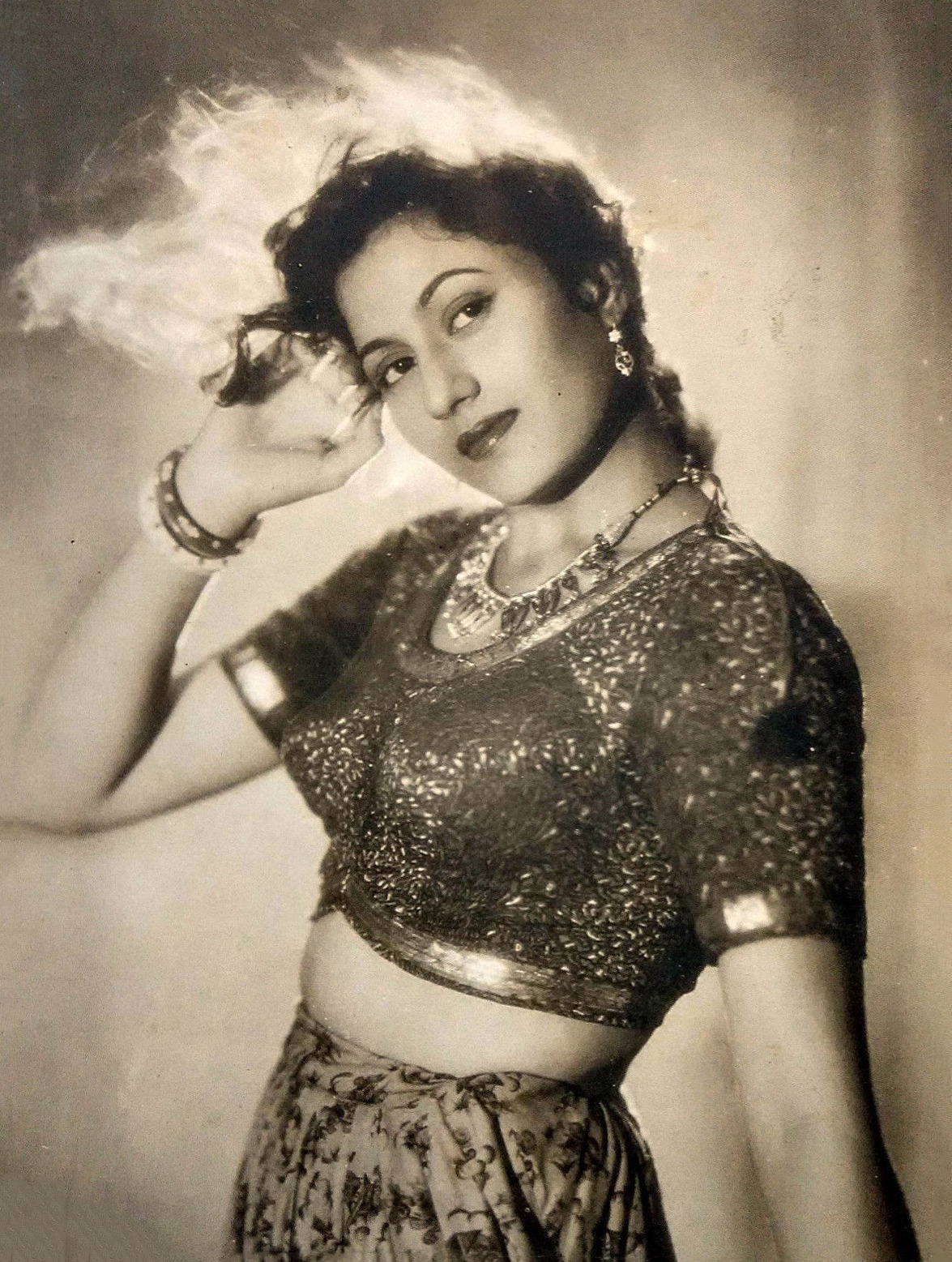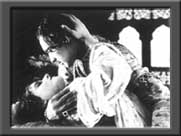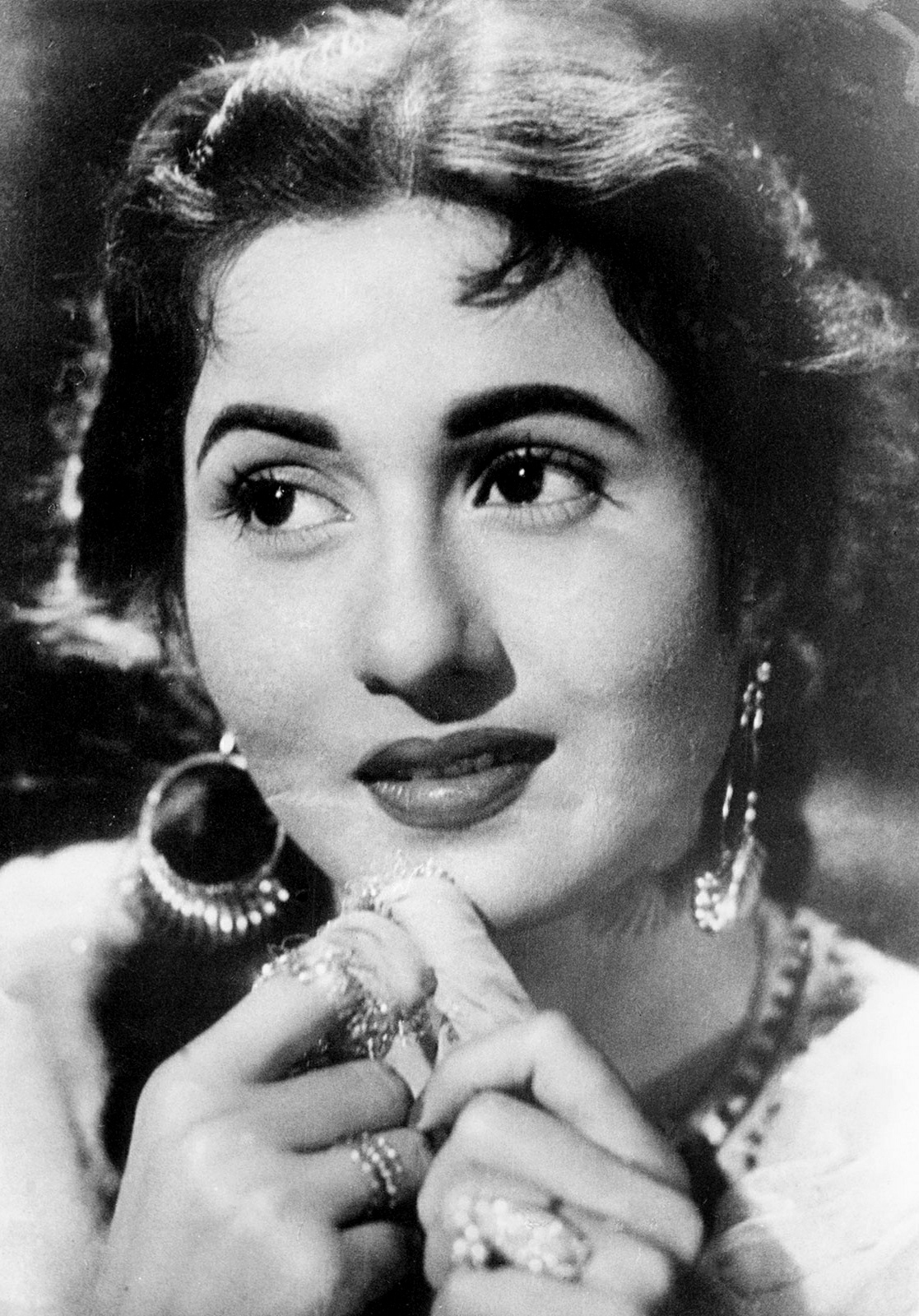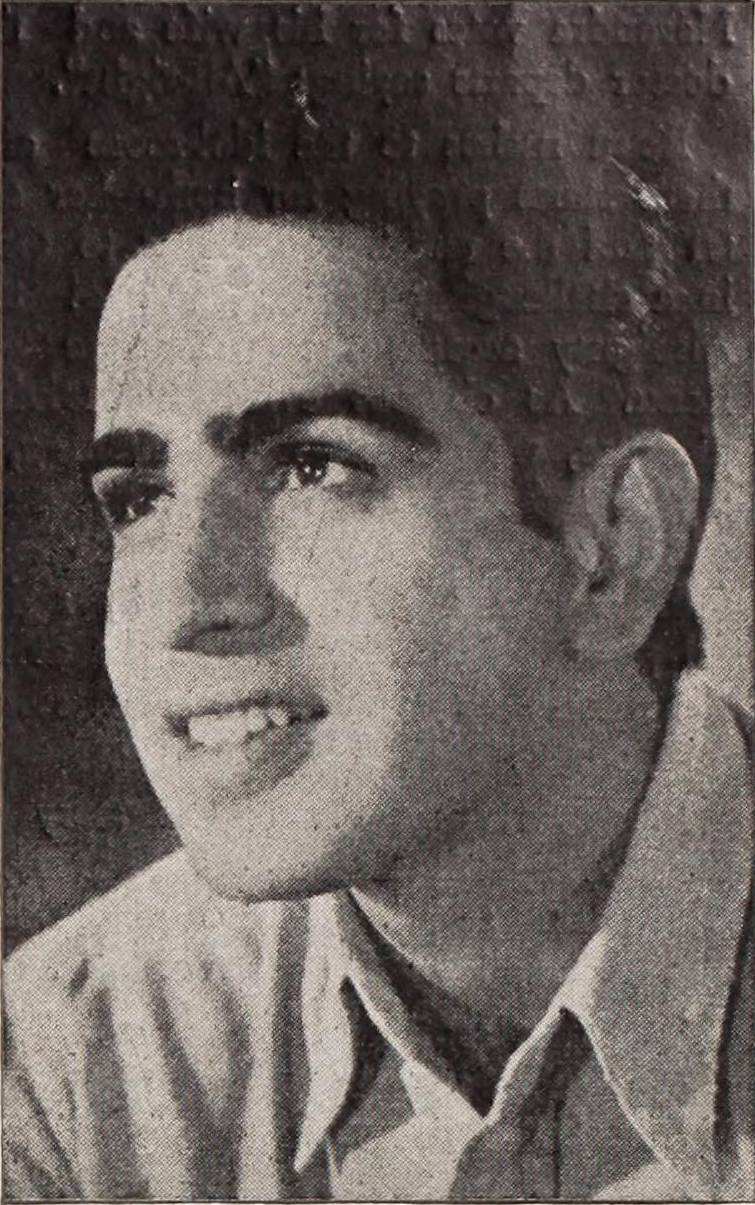|
Madhubala
Madhubala (born Mumtaz Jehan Begum Dehlavi; 14 February 1933 – 23 February 1969) was an Indian actress and producer who worked in Hindi-language films. She ranked as one of the highest-paid entertainers in India in the post-independence era, that coincided with the rise of Indian cinema on global levels. In a career spanning more than 20 years, Madhubala was predominantly active for only a decade but had appeared in over 60 films by the time of her death in 1969. Born and raised in Delhi, Madhubala relocated to Bombay with her family when she was 8 years old and shortly after appeared in minor roles in a number of films. She soon progressed to leading roles in the late 1940s, and earned success with the dramas '' Neel Kamal'' (1947) and ''Amar'' (1954), the horror film '' Mahal'' (1949), and the romantic films ''Badal'' (1951) and ''Tarana'' (1951). Following a brief setback, Madhubala rose to international prominence with her roles in the comedies '' Mr. & Mrs. '55'' (1955) ... [...More Info...] [...Related Items...] OR: [Wikipedia] [Google] [Baidu] |
Mahal (1949 Film)
''Mahal'' () is a Bollywood films of 1949, 1949 Cinema of India, Indian Hindi-language horror film produced by Savak Vacha and Ashok Kumar under the banner of Bombay Talkies, and directed by Kamal Amrohi as his directorial debut. The film centres on a screenplay written by Amrohi, while its music is composed by Khemchand Prakash. Cited as Bollywood horror films, Bollywood's first horror film, it revolves around an aristocrat (Ashok Kumar) who moves into an ancient mansion, where he gets visions of a mysterious lady (Madhubala) claiming to be his lover in their previous lives. ''Mahal'' was produced by Bombay Talkies studio on a modest budget. Amrohi, who made his directorial debut with the film, was turned down by many major female stars before then-fledgling Madhubala was put on the board. The film took a relatively long time filming that earned it a negative reputation in the media. ''Mahal'' was released in theatres in October 1949. Despite mixed-to-negative critical reviews, ... [...More Info...] [...Related Items...] OR: [Wikipedia] [Google] [Baidu] |
Madhubala Filmography
Madhubala (1933–1969) was an Indian actress and producer who appeared in 73 Hindi-language films in a career spanning from early 1940s to mid-1960s. She made her debut at age 9 playing an uncredited role in the romantic musical '' Basant'' (1942)''. ''In 1944, she signed a contract with Ranjit Movietone, under which she featured in minor roles for the next two years. The contract ended in 1947, prompting director Kidar Sharma to cast Madhubala as the leading lady in the drama ''Neel Kamal'' (1947). Although a commercial failure, the film garnered her critical praise, and she subsequently rose to prominence after playing key characters in the drama ''Lal Dupatta'' (1948) and the horror film ''Mahal'' (1949). For a brief period, Madhubala continued starring in a number of successful productions, including the romantic musical ''Dulari'' (1949), the dramas ''Beqasoor'' (1950) and ''Sangdil'' (1952), and the romances ''Badal'' (1951) and ''Tarana'' (1951), frequently collabor ... [...More Info...] [...Related Items...] OR: [Wikipedia] [Google] [Baidu] |
Mughal-e-Azam
''Mughal-e-Azam'' () is a 1960 Indian epic historical drama film produced and directed by K. Asif. Starring Prithviraj Kapoor, Dilip Kumar, Madhubala, and Durga Khote, it follows the love affair between Mughal Prince Salim (who went on to become Emperor Jahangir) and Anarkali, a court dancer. Salim's father, Emperor Akbar, disapproves of the relationship, which leads to a war between father and son. The development of ''Mughal-e-Azam'' began in 1944, when Asif read a 1922 play called ''Anarkali,'' by the playwright Imtiaz Ali Taj, which is set in the reign of Emperor Akbar (1556–1605). Production was plagued by delays and financial uncertainty. Before its principal photography began in the early 1950s, the project had lost a financier and undergone a complete change of cast. ''Mughal-e-Azam'' cost more to produce than any previous Indian motion picture; the budget for a single song sequence exceeded that typical for an entire film of the period. The soundtrack, insp ... [...More Info...] [...Related Items...] OR: [Wikipedia] [Google] [Baidu] |
Tarana (1951 Film)
''Tarana'' () is a 1951 Indian Hindi-language romantic comedy film produced and written by K. S. Daryani and directed by Ram Daryani. Starring Madhubala and Dilip Kumar together for the first time, ''Tarana'' revolves around the titular character (Madhubala), a free-spirited village girl who falls in love with a visiting doctor (Kumar). ''Tarana'' is best remembered as the production during which Madhubala and Kumar began a highly publicised affair that lasted for nearly six years. Released on 5 October 1951, the film became one of the biggest box office hits of the year and earned overwhelming positive reviews from critics, mostly for the lead pair's onscreen chemistry, music and direction. Plot After a plane crash, Dr. Motilal (Dilip Kumar), is left stranded in a small village, where he is given shelter by a blind old man called Surdas and his playful, young daughter Tarana (Madhubala). During the course of their stay, the Motilal falls for the charms of the innocent Tarana ... [...More Info...] [...Related Items...] OR: [Wikipedia] [Google] [Baidu] |
Howrah Bridge (1958 Film)
''Howrah Bridge'' is a 1958 Indian Hindi-language crime thriller film directed by Shakti Samanta. The music for the film was composed by O. P. Nayyar. The plot focuses on Prem Kumar (played by Ashok Kumar), a businessman from Rangoon, who travels to Calcutta to try and track down his brother's murderers. Madhubala stars as Edna, a cabaret dancer, in one of her most popular roles. ''Howrah Bridge'' was a major critical and commercial success upon its release and has become a cult film over years. It has been specially noted for its soundtrack, which consists the chartbusters "Mera Naam Chin Chin Chu" and "Aaiye Meherbaan". The former was re-used in the 1988 film ''Salaam Bombay!''. Plot Prem Kumar (Ashok Kumar) and his elder brother Madan (Chaman Puri) are looking after a successful business of their father in Rangoon. But Madan suddenly disappears with the family heirloom, a dragon embedded with precious stones and reaches Calcutta to sell it off. He falls prey to the designs ... [...More Info...] [...Related Items...] OR: [Wikipedia] [Google] [Baidu] |
Barsaat Ki Raat
''Barsaat Ki Raat'' () is a 1960 Indian Hindi-language romantic musical film directed by P. L. Santoshi and produced by R. Chandra. Starring Madhubala, Bharat Bhushan and Shyama, the film is considered a defining example of romantic musical film genre. A Muslim-social set amongst the erudite and cultured urban Muslims of independent India, ''Barsaat Ki Raat'' revolves around two lovers Shabnam (Madhubala) and Amaan Hyderabadi (Bhushan), who strive to be together but the society does not approve of them. Upon its release, the film became a blockbuster success, the second highest earner of 1960, the twenty highest earner of the 1960s at the Indian box office, and one of the top hundred highest-grossers of all time (when adjusted for inflation). ''Barsaat Ki Raat'' got a positive feedback from contemporary critics. The Roshan-composed soundtrack, considered one of the finest in the Indian cinema, was singled out for praise by both critics and audience. One of the tracks, "Zind ... [...More Info...] [...Related Items...] OR: [Wikipedia] [Google] [Baidu] |
Kishore Kumar
Kishore Kumar (born as Abhas Kumar Ganguly (); 4 August 1929 – 13 October 1987) was an Indian playback singer and actor. He is widely regarded as one of the greatest, most influential and dynamic singers in the history of Indian music. He was one of the most popular singers in the Indian subcontinent, notable for his yodeling and ability to sing songs in different voices. He used to sing in different genres but some of his rare compositions, considered classics, were lost in time. According to his brother and legendary actor Ashok Kumar, Kishore Kumar was successful as a singer because his "voice hits the mike, straight, at its most sensitive point". Besides Hindi, he sang in many other Indian languages, including Bengali, Marathi, Assamese, Gujarati, Kannada, Bhojpuri, Malayalam, Odia and Urdu. He also released a few non-film albums in multiple languages, especially in Bengali, which are noted as all-time classics. He won 8 Filmfare Awards for Best Male Playback Singer ... [...More Info...] [...Related Items...] OR: [Wikipedia] [Google] [Baidu] |
Dilip Kumar
Mohammed Yusuf Khan (; 11 December 1922 – 7 July 2021), better known by his stage name Dilip Kumar, was an Indian actor who worked in Hindi cinema. Credited with pioneering method acting in cinema, he dominated the Indian movie scene from late 1940s throughout 1960s, * * See Dilip Kumar section, * * being referred to as ''"Abhinay Samrat"'' (Hindi for "Emperor of Acting") by the audience. Kumar holds the record for most wins for the Filmfare Award for Best Actor (eight, which was later equalled by Shah Rukh Khan) and was also the inaugural recipient of the award. He holds the best box-office record for a star (male or female) in Hindi cinema with over eighty-percent box-office successes."The best box office record for a star(male or female) in hindi films is held by the legendary Dilip Kumar." *"Based on purely box office record Dilip Kumar stands way ahead as his is by far the best box office record with 80% of his films being successes and nearly 50% outright hits." * ... [...More Info...] [...Related Items...] OR: [Wikipedia] [Google] [Baidu] |
Amar (1954 Film)
''Amar'' () is a 1954 Indian Hindi-language romantic drama film produced and directed by Mehboob Khan. Dealing with the controversial subject matter of rape, the film revolves around the titular upper-class lawyer (Dilip Kumar), his feminist fiancé, the social worker Anju Roy (Madhubala), and Sonia (Nimmi), a poor milkmaid. Plot Amarnath (Dilip Kumar), a well-known lawyer, is known for his sense of justice. One day, he meets Soniya (Nimmi), a milkwoman. She is awed by him and he finds her interesting. Amar's father wants him to get married and sends him Anju's (Madhubala) photograph. Anju has graduated from a foreign University and believes in justice and aiding the poor. Both she and Amar take a liking to each other and they are soon engaged. One night, after attending a local fair, Soniya is attacked by the local ruffian Shankar (Jayant) who wants to possess her at any cost. In a bid to escape him Soniya runs heedlessly into Amar's house as a thunderstorm begins. In the lonel ... [...More Info...] [...Related Items...] OR: [Wikipedia] [Google] [Baidu] |
Neel Kamal (1947 Film)
''Neel Kamal'' () is a 1947 Indian Hindi-language drama film directed by Kidar Sharma and starring Begum Para, Madhubala and Raj Kapoor. The first film to feature Madhubala and Kapoor in leading roles, ''Neel Kamal'' follows two separated royal sisters (Para and Madhubala), whose mutual love for a self-absorbed artist (Kapoor) ultimately leads the younger sister to suicide. It earned 2.5 million at the box-office and was a moderate success. Plot Set in the royal court of Janakgarh, the film opens with the palace coup led by the villainous Mangal Singh against his sister's husband, the king of Janakgarh, Maharana Pragat Singh. The mortally wounded king escapes from the palace with his queen and their two daughters. They take shelter in a temple disguised as ordinary citizens. The elder princess ventures out on her horse disguised as a young boy to get help from her uncle, the king's brother Maharana Kharak Singh who rules another state. She succeeds in escaping treacherous at ... [...More Info...] [...Related Items...] OR: [Wikipedia] [Google] [Baidu] |
Chalti Ka Naam Gaadi
''Chalti Ka Naam Gaadi'' () is a 1 January 1958 Indian musical comedy film directed by Satyen Bose. Starring Madhubala with the Ganguly brothers —Ashok Kumar, Anoop Kumar, and Kishore Kumar— the film revolves around a middle-aged man who resents women due to some misunderstandings and forbids his younger brothers from marrying. Expected by Kishore Kumar to flop, ''Chalti Ka Naam Gaadi'' opened to major commercial success, eventually becoming the most successful work of Bose and Ganguly brothers, as well as Madhubala's fourth consecutive major hit of 1958, thus solidifying her position as the top female star of late 1950s and early 1960s. ''Chalti Ka Naam Gaadi'' has received overwhelming positive reviews from critics for its comical situations, soundtrack, execution and performances. Over years, the film has gained classic status and has also inspired several films including '' Badhti Ka Naam Dadhi'' (1974), ''Saade Maade Teen'' (2006) and '' Dilwale'' (2015). It was r ... [...More Info...] [...Related Items...] OR: [Wikipedia] [Google] [Baidu] |
Baadal (1951 Film)
''Badal'' is a 1951 Indian Hindustani-language romantic action film directed by Amiya Chakravarty and produced by Bhagwan Das Varma. Starring Madhubala, Prem Nath (in the titular role) and Purnima, the film tells the story of a common man named Badal, who wants to exact revenge upon the Jagirdar for killing his father but ends up falling for his daughter Ratna. Released in May 1951, ''Badal'' became one of the biggest box-office hits of the year. Plot Badal Singh is a young man whose father was brutally killed for not being able to pay the revenue to the collectors. The king is away, and the kingdom is ruled by a greedy Jagirdar. Badal, in order to exact revenge upon his father's murderers, forms a group of village man who steal from the Jagirdar's palace and distribute the stolen money among the people. An old Jagirdar, has to thus, announce a reward of hundred golden coins for the person who would bring Badal to his feet, but no one is able to catch him. One day, Badal a ... [...More Info...] [...Related Items...] OR: [Wikipedia] [Google] [Baidu] |

.jpg)




.jpg)
